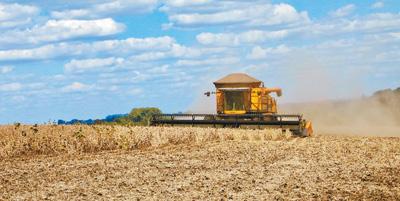"The Chinese market is important to us"
In Rio Grande do Sul, the southernmost state of Brazil, March-April is the time when soybeans mature. On the farm of Carmo, a local farmer, the golden yellow soybean field was almost empty, and the combine harvester in the field was roaring (see above, photo by Zhang Yuannan, reporter of this newspaper). Watching the continuous loading of soybeans, Carmo told reporters cheerfully: "This year is another bumper year."
In recent years, more and more Brazilian farmers have chosen to grow soybeans. With the continuous improvement of agricultural science and technology, the output is getting higher and higher. The Brazilian Soybean Producers Association predicts that Brazil ’s soybean harvest this year is expected to reach a record 121 million tons, surpassing the United States as the world ’s largest soybean producer.
China has been the largest buyer of Brazilian soybeans for many years. Data show that Brazil will export 74 million tons of soybeans in 2019, of which 58 million tons will be sold to China, accounting for 78%. "The Rio Grande do Sul is the third largest soybean producer in Brazil. The Chinese market is very important to us. Our farm continues to grow with the expansion of the Chinese market." Carmo's farm area exceeds 1,000 hectares. He said that local farmers pay close attention to the Chinese market all year round, have full confidence in China's economic resilience, and are full of expectations for Chinese market demand.
"China is our important trading partner." Daniel Amaral, chief economist of the Brazilian Vegetable Oil Industry Association, said that Brazil's soybean exports to China are expected to remain high this year.
In addition to soybeans, China is also an important market for the export of agricultural products such as cane sugar and meat in Brazil. Data show that in 2019, Brazil's agricultural products exported to China accounted for 32% of its total exports. In Rio Grande do Sul, this percentage is as high as 43%. In January of this year, Brazilian melon began to export to China. In the future, the variety of agricultural trade between the two countries is expected to continue to increase.
At present, Sino-Pakistani agricultural cooperation takes various forms. Chinese companies such as COFCO International and Dakang Agriculture have invested in Brazil to actively integrate into the local agricultural industry chain. Amaral believes that China's investment in Brazil's agricultural sector is very important, promotes mutual benefit and common development between the two sides, brings employment and income to Brazil, and the partnership between the two countries is becoming stronger.
China-Pakistan agricultural research institutions have also continued exchanges and cooperation. Anna, head of the Wheat Research Institute of Brazil's Agricultural and Animal Husbandry Research Corporation, said: "The cooperation in agricultural scientific research between Pakistan and China is very important, especially on some common issues, both sides need to maintain communication and help each other.
In addition, Chinese companies are also actively investing in infrastructure areas such as Brazilian ports to provide support for Brazil to improve its logistics level, and China-Pakistan trade channels have become increasingly smooth. The Brazilian Minister of Agriculture, Christina, believes that the agricultural cooperation between Brazil and China has achieved remarkable results and looks forward to the continuous expansion of the scale of agricultural trade and the deepening of related cooperation including the construction of logistics infrastructure.
Recently, due to the impact of the new crown pneumonia epidemic, some ports in Brazil have encountered difficulties in operation. More than 40 agricultural product associations, including the Brazilian Soybean Producers Association and the Brazilian Meat Export Association, recently sent a letter to President Bossonaro to recommend measures to ensure the free transit of goods and reduce the impact of the epidemic on agricultural exports. The Brazilian government has requested the following to standardize the protection of port workers and ensure that all domestic port functions remain normal. Relevant departments stated that they are taking corresponding measures to guarantee the export of agricultural products.
(This newspaper Paso Fondo, Brazil)
Our reporter in Brazil, Zhang Yuannan

